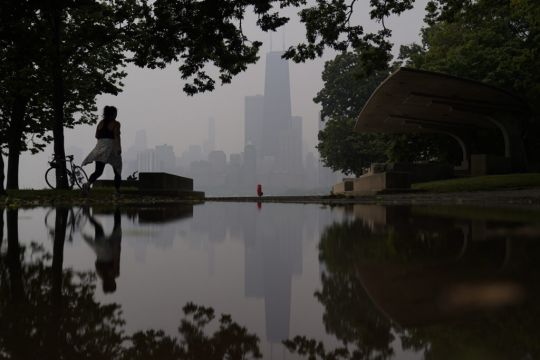Drifting smoke from the ongoing wildfires across Canada is creating curtains of haze and raising air quality concerns throughout the Great Lakes region and in parts of the central and eastern United States.
The Environmental Protection Agency’s AirNow.gov site showed parts of Illinois, lower Michigan and southern Wisconsin had the worst air quality in the US on Tuesday afternoon, and Chicago, Detroit and Milwaukee had air quality categorised as “very unhealthy”.
In Minnesota, a record 23rd air quality alert was issued on Tuesday through to late Wednesday night across much of the state, as smoky skies obscure the skylines of Minneapolis and St Paul.
Michigan’s Department of Environment, Great Lakes, and Energy issued an air quality alert for the entire state. Wisconsin’s Department of Natural Resources also issued an air quality advisory for the state.

In Chicago, officials urged young people, older adults and residents with health issues to spend more time indoors.
“Just driving into the zoo… you could just see around the buildings, kind of just haze,” said Shelly Woinowski, who was visiting the Lincoln Park Zoo in Chicago.
Fires in northern Quebec and low pressure over the eastern Great Lakes are sending smoke through northern Michigan, and across southern Wisconsin and Chicago, said Bryan Jackson, a meteorologist with the National Weather Service.
Mr Jackson added that a north wind would push the smoke further south, moving into Illinois, Indiana and Kentucky.
The Canadian Interagency Forest Fire Centre reported on Monday that 29,393 square miles of land including forests has burned across Canada since January 1. That exceeds the previous record set in 1989 of 29,187 square miles, according to the National Forestry Database.
Nationally, there are currently 490 fires burning, with 255 of them considered to be out of control.

Even recent rainfall in Quebec probably will not be enough to extinguish the wildfires ravaging the northern part of that province, but the wet weather could give firefighters a chance to get ahead of the flames, officials said.
Nearly a quarter of the fires burning in Canada are in Quebec. Environment Canada meteorologist Simon Legault said he expects rain to stop falling by Wednesday morning in the regions most affected by forest fires.
Earlier this month, massive fires burning stretches of Canadian forests blanketed the north-eastern United States and the Great Lakes region, turning the air yellowish grey, and prompting warnings for people to stay inside and keep windows closed.
The small particles in wildfire smoke can irritate the eyes, nose and throat, and can affect the heart and lungs, making it harder to breathe. Health officials say it is important to limit outdoor activities as much as possible to avoid breathing in these particles.
“Until the fires are out, there’s a risk,” Mr Jackson said. “If there’s any north component to the wind, there’s a chance it’ll be smoky.”
In early June, US President Joe Biden said in a statement that hundreds of American firefighters and support personnel have been in Canada since May, and called attention to the fires as a reminder of the impacts of climate change.
The warming planet will produce hotter and longer heatwaves, making for bigger, smokier fires, according to Joel Thornton, professor and chair of the department of atmospheric sciences at the University of Washington.







